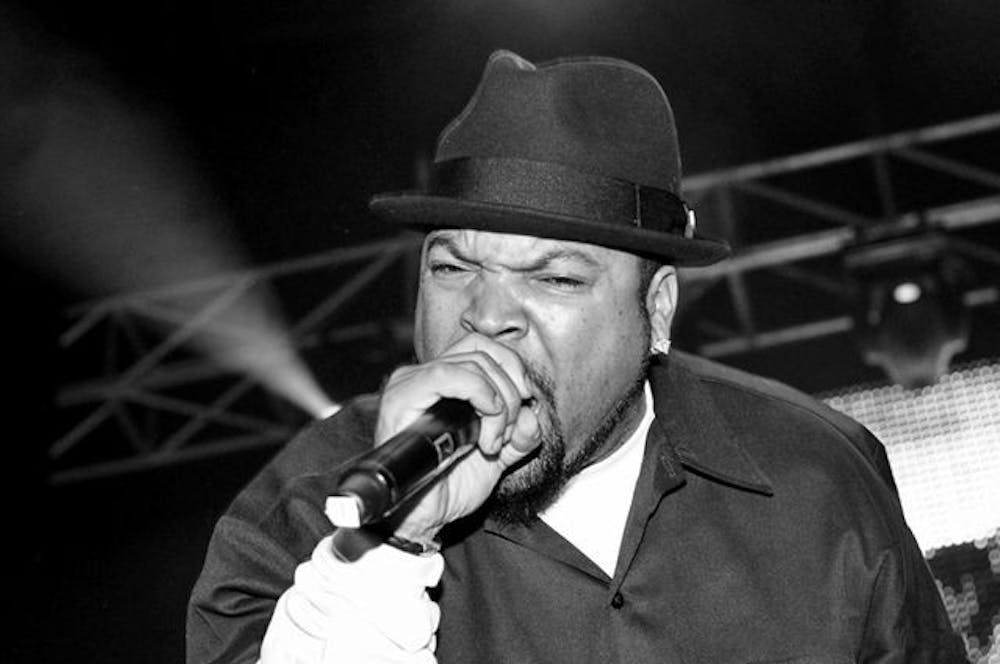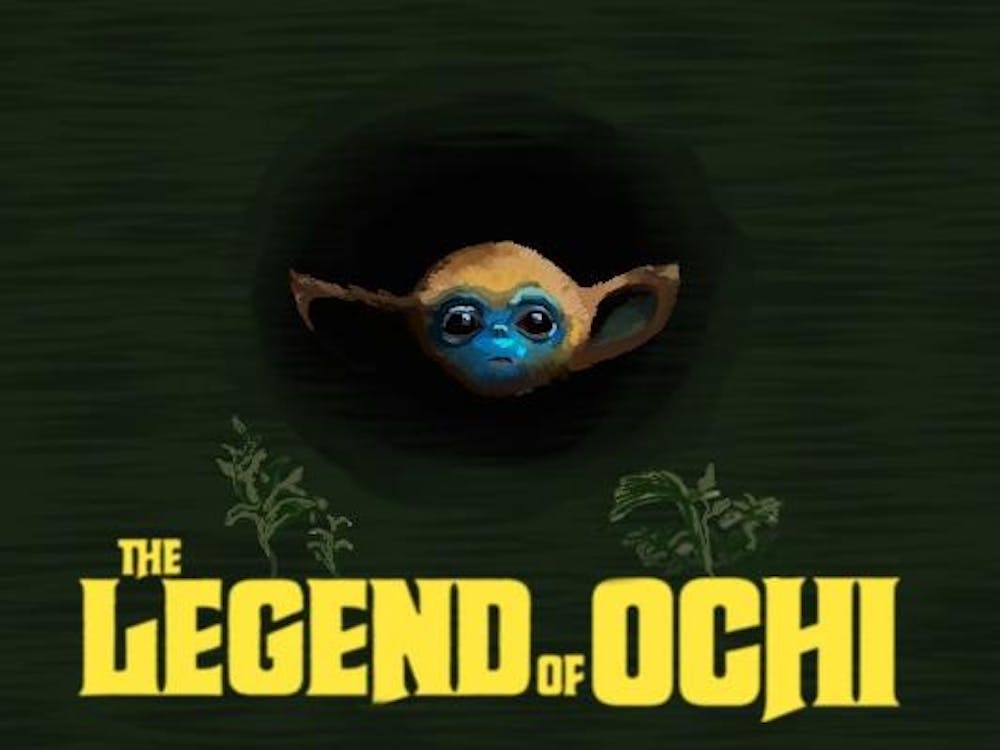Rapper and actor Ice Cube released his 11th studio album, “Man Down,” Nov. 22. Unfortunately, Cube’s prowess is subdued in this project, resulting in a decidedly glib product — not only is the flow uninspiring and his lyrics static, but his predictable cadence also means that clickbait lyrics are the only thing which works to retain the audience’s attention.
Despite Ice Cube’s notoriety, the Los Angeles artist, 55, fails to defy the rap community’s contempt towards older rappers. Throughout his decorated rap career, Cube has accumulated a brilliant discography, but with the mediocrity of “Man Down,” room for another hit song has elapsed.
On “Man Down,” Cube writes from the perspective of an older artist criticizing younger generations and their societal norms. The project includes criticisms of pronoun usage and “IG models” while also taking strong shots at internet rappers and social media.
Cube raps on the album’s third track, “So Sensitive,” “So what the **** are trigger words? / Words like his and hers? / What's a pronoun and a verb? / Follow this, then you follow back.”
With lyrics like these, he alienates his youngest listeners who may be familiar with him through contemporary media platforms or his popular basketball street-ball league, BIG3.
Further alienating some listeners, Cube seems to suggest that masculinity is in crisis in today’s age. In a press release, Cube emphasized the album’s message, that “real men need to stand up” — for what, it is unclear. He also promised “wisdom and criticism from a steadfast alpha male of the entertainment industry," attempting to leverage his position of popularity for a greater philosophical platform.
“A lot [of] men are just sitting around watching the show and not doing what they need to do to make sure everything is going right,” Cube said. “Everybody is worried about how they feel — Forget doing what you need to do, doing what’s right, doing what’s supposed to be done.”
Cube’s Charlie Kirk-esque argument encourages men to “break the mirror” — encouragement to resist societal norms he considers emasculating. Instead of reflecting the values of contemporary society, Cube argues listeners should “[show] up as their best self” in life, making a direct appeal to listeners in the album’s 15th track, “Break the Mirror." The cultural commentary is unpersuasive, as his reasoning on the track is murky and reinforces stereotypes of masculinity that distract from his broader messaging of self improvement.
Cube raps on the track, “I don’t act feminine / kinda like him and them / I’m toxic as Eminem,” referring to the controversy surrounding Detroit rapper Eminem’s recent album, “The Death of Slim Shady (Coup de Grâce),” where Eminem launches a diatribe against cancel-culture and pronouns acutely designed to invoke offense. Identifying himself with Eminem leaves Cube bereft of a unique argument, dulling his call for rebellion.
In terms of the project’s sound, Cube catches the beat at all the appropriate times for a sonically competent product, but lacks a productive lyrical performance. While he passably mimics his famed ‘90s style, his attempt to rap about the same content decades later falls flat. Cube’s detailed seduction throughout tracks “She’s Sanctified” and “5150” feels misplaced, and his frivolous commentary remains awkward.
Though likely not destined for an extended stay on top charts, “Man Down” does have some standout songs worth a listen.
Cube’s pre-released single “It’s My Ego” recants Cube’s former prominence as he claims he “was Kendrick before Kendrick.” However, this lyric comes as a counterintuitive claim after naming the album’s fifth track “Not Like Them,” seemingly a nod to Compton, CA rapper Kendrick Lamar’s chart-topping single “Not Like Us.” Despite this contradiction, the track is the project’s catchiest, and its early placement on the album helps retain curious listeners even with its confused messaging.
Cube employs several unconventional beats, by his own old-school standards, throughout the album — the most noticeable on “Take Me to Your Leader,” the project’s penultimate song. The track is Cube’s most direct appeal against public conformity, rapping “movin' like sheep, now you're walkin' with the groups / I move like an eagle lookin' regal / Y'all move like a flock of seagulls / How you gon' move the needle?” Cube urges listeners to regain their self-control by rejecting their leader, the perceived societal codes of conduct.
“Man Down” concludes with one of its better tracks, “Ego Maniacs.” Cube continues his flow from “It’s My Ego,” bolstered by contributions from Grammy-winning Atlanta rapper Killer Mike and Brooklyn rapper Busta Rhymes. The artists slide through the track with an identifiably ‘90s flow over a clean snare-heavy beat. Both guest artists rave about Cube, with Busta Rhymes openly acknowledging the infrequency of experienced artists’ success in rap — “I never seen this act of hunger from rappers platinum already.”
The quality of the album’s final track, however, isn’t enough to save the project as a whole.
As rap continues to embrace innovation, Ice Cube’s reliance on nostalgia underscores the difficulty veteran artists face in navigating an industry defined by its constant progression. Cube’s waning favorability is a dilemma confronted by many rappers who found success in the 80’s and 90’s, a trend noted by his rap counterparts. For example, André 3000, a 49 year-old Atlanta rapper and half of the beloved rap duo Outkast, believes rapping at his age is inauthentic.
“What do you talk about — I gotta go get a colonoscopy?” Andre 3000 said. “What do you rap about — my eyesight is going bad?”
A.D. Carson, Assoc. Prof. of Hip-Hop and the Global South, said that this attitude is rampant in the rap community in a contribution to AFRO News.
“Ageism in hip hop is especially strong because the first generation of rappers is only now reaching their golden years,” Carson said. ““[Rap is] closely intertwined with the perception of youth culture.”
Ice Cube is undeniably a legendary figure in rap’s history. His rap group N.W.A., depicted in blockbuster film “Straight Outta Compton,” was the driving force behind the emergence of west-coast gangsta rap.
Cube’s pursuit of the past, however, is unable to convince listeners he has “still got it.” While listeners will tune in to “Man Down” because Ice Cube’s name is on it, they will find little of value to take away from the project. The album’s lack of depth is underscored by the recycling of beats and flows between two of its standout tracks and lack of a persuasive, coherent or reasonably relevant message, reflecting the overall ineffectiveness of Cube’s latest effort.







